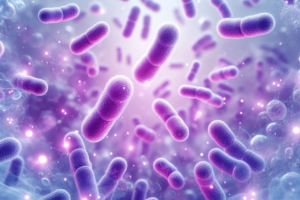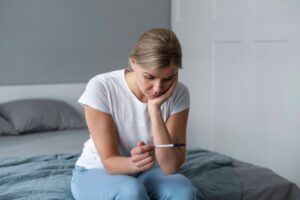What are Sleep disorders?
Sleep-wake disorders, also termed as sleep disorders, involve problems associated with timing, quality, and amount of sleep, which can ultimately result in impairment in functioning and can also cause daytime distress. Sleep disorders often occur with medical conditions or with some mental health conditions, such as cognitive disorders, anxiety, and depression. There are multiple types of sleep disorders, such as insomnia, obstructive sleep apnea, parasomnias, restless legs syndrome, circadian rhythm disorders, narcolepsy, and REM sleep behavior disorder. Insomnia is the most common sleep disorder.
Sleep difficulties are linked to both emotional and physical problems. Sleep problems can contribute to or exacerbate mental health conditions and can be a symptom of other mental health conditions.1
Importance of Sleep
Sleep is a very basic need and is critical to both physical and mental health. There are two types of sleep that can generally occur in a pattern of three to five cycles per night:
- Rapid eye movement (REM)- Period when most dreaming occurs
- Non-REM- has three phases,such as
- Eyes are closed, but easy to wake up
- Eyes are in light sleep
- Deep sleep stage
The human body very typically works on a 24-hour cycle (Circadian rhythm) that helps us know when to sleep. The amount of sleep we need varies depending on our age and from person to person.
According to the National Sleep Foundation, most adults need around seven to eight hours of restful sleep each night. The foundation revised its sleep recommendations in 2015 based on a rigorous review of the literature. Many of us do not get enough rest or sleep. Nearly 30% of adults get less than six hours of sleep each night.
As we know, sleep helps the brain function properly. Not getting proper sleep or even a poor quality of sleep may have many potential outcomes. The most obvious concerns are decreased energy and fatigue, irritability, and focusing problems. The ability to make decisions and your mood can also be altered. Sleep problems often coexist with symptoms such as depression or anxiety. Sleep problems can exacerbate depression or anxiety, and this may lead to some of the sleep problems.
What are the most common sleep disorders?
-
Insomnia:3
What is Insomnia?
Have you ever had trouble sleeping at night? Insomnia involves mainly difficulty falling and remaining asleep. About one-third of adults report some or other insomnia symptoms; 10-15% report problems with functioning during the daytime; and 6-10% have symptoms severe enough to meet criteria for insomnia disorder.
Types of Insomnia
- Short-term insomnia: Between one and six months
- Transient insomnia: Less than one month
- Chronic insomnia: More than six months
Symptoms of insomnia can be:
- Episodic (with an episode of symptoms lasting one to three months)
- Recurrent (with two or more episodes within a year)
- Persistent (with symptoms lasting three months or more)
Treatment and self-help
Sleep problems can often be improved with regular sleep habits. Chronic insomnia is typically treated with a combination of sleep medications and some behavioral techniques, such as cognitive behavior therapy. Most over-the-counter sleep medicines contain antihistamines, which are most commonly used to treat allergies. They are not at all addictive but can become less effective over time.
According to the National Institutes of Health, some may be safe and effective, and some of the natural remedies can also be an option.
- Melatonin: Melatonin supplements can be helpful for people with insomnia; it is a chemical used by the brain to alert it that it is time to go to sleep. It can come in prescription strength and also in lower strengths, which are available over the counter.
- Lavender oil: Essential oil that is derived from the lavender plant. Used for thousands of years as a natural remedy to improve sleep and also help induce feelings of calmness. Supplements containing 80 mg of lavender oil can be taken as a safe and effective dosage.
- Chamomile: Chamomile taken as tea, as an essential oil, or as a dietary supplement can be used by older people with insomnia to significantly improve sleep quality.
- Magnesium: A mineral that is produced by the body. It helps muscles relax and also helps reduce stress. Many experts think that it also helps to encourage a healthy sleep-wake cycle.
-
Restless Legs Syndrome (RLS):4
RLS, also called Willis-Ekbom disease, is a neurological disorder that affects the majority of the population. RLS is a sleep disorder that can be described as a strong, irresistible urge to move the leg while sleeping. It can be experienced as muscle tension, tingling, or crawling along the legs and feet. This discomfort eases when the person moves and rubs their legs. RLS makes it difficult to fall asleep or sleep through the night.
Natural remedies for restless leg syndrome
- Adopting Healthy Habits: Avoiding the three most important substances, such as caffeine, tobacco, and alcohol, which can also trigger the symptoms of RLS.
- Hot and Cold Therapy: Application of hot and cold compresses to the affected area may soothe restless leg syndrome symptoms.
- Relaxation techniques: Practicing deep breathing and meditation, which may help reduce restless leg symptoms.
- Vitamins: By maintaining sufficient levels of calcium and magnesium to keep your muscles and nerves functioning properly, taking a daily dose of a multimineral or multivitamin may tame restless leg syndrome symptoms. Low levels of iron can also result in restless leg syndrome. To boost iron intake through foods, we can get it from sources like beans, nuts, seeds, and dark green leafy vegetables.
- Alternative therapies: Chinese therapies such as Acupuncture helps relieve restless leg syndrome.
-
REM Sleep Behavior Disorder (RBD):5
Rapid eye movement (REM) sleep behavior disorder is a sleep disorder in which a person may physically act out vividly, and have often unpleasant dreams with vocal sounds and sudden, violent arm and leg movements during REM Sleep-also sometimes termed as dream-enacting behavior. This disorder can become alarming when the sleeping person engages in dangerous behavior or acts out violently.
Symptoms of RBD:
- Screaming
- Lashing out physically
- Cursing
- Punching and kicking
- Sleepwalking
- Talking
Natural remedies for the treatment of RBD:
- Yokukansan (YKS), an herbal treatment consisting of seven herbal ingredients (Bupleurum root, Glycyrrhiza, Cnidium rhizome, Uncaria hook, Japanese Angelica root, Atractylodes lancea rhizome, and Poria sclerotium), has been reported to be effective for behavioral and psychological symptoms of dementia.
- Saffron: Saffron is used in traditional medicine and is used in depression and anxiety. In addition to this, saffron has beneficial effects on sleep duration and quality. It is a natural and safe nutritional strategy to improve sleep duration and quality in populations who suffer from mild to moderate chronic primary sleep disorders.
- Lemon balm: Lemon balm is an herb from the mint family. It contains chemicals that have a significant sedative and calming effect. It can be used to improve symptoms of depression in adults with depression and/or anxiety.
-
Circadian Rhythm Disorders:
Circadian rhythm sleep disorders are a group of sleep disorders that all share the common feature of a disruption in the timing of sleep. Circadian in Latin means “around or approximately” (circa) a day (diem). Circadian rhythm is the name given to your body’s 24-hour “internal clock”. This internal clock has control over the body’s sleep- wake cycle. A person can have difficulty falling asleep, struggle to stay asleep, and often wake up several times during the sleep cycle. A person can also wake up early and can’t go back to sleep.
Common types of Circadian rhythm sleep disorders
- Delayed Sleep Phase Disorder
- Jet Lag
- Shift Work Disorder
Natural Remedies for Circadian rhythm disorders
- Melatonin supplements: Also called melatonin receptor agonists, can be used to treat non-24-hour sleep-wake rhythm disorders. A few side effects can include fatigue and dizziness.
- Caffeine: Caffeine helps to prevent daytime sleepiness. It can be used effectively to treat symptoms of circadian rhythm disorder.
- Valerian: Valerian, or valerian root, is derived from the root of a flowering plant that acts as a relaxant for the brain and nervous system. It is proven to promote a sense of calm.
Conclusion:
The impact of sleep disorders can be disruptive. There will be a point where we also require immediate relief. When sleeplessness starts interfering with everyday life it is important to seek medical attention. Multiple options are available, either physical, behavioral, and natural remedies that can be effective in treating all sleep-related disorders.
Reference:
- K Pavlova M, Latreille V. Sleep Disorders. Am J Med. 2019 Mar;132(3):292-299. doi: 10.1016/j.amjmed.2018.09.021. Epub 2018 Oct 4. PMID: 30292731.
- Recorded Webinar: Exploring Sleep Disorders – UCLA Health
- Buysse DJ. Insomnia. JAMA. 2013 Feb 20;309(7):706-16. doi: 10.1001/jama.2013.193. PMID: 23423416; PMCID: PMC3632369.
- https://www.verywellhealth.com/natural-remedies-for-restless-leg-syndrome-89307
- Jung Y, St Louis EK. Treatment of REM Sleep Behavior Disorder. Curr Treat Options Neurol. 2016 Nov;18(11):50. doi: 10.1007/s11940-016-0433-2. PMID: 27752878.
- https://www.ckbhospital.com/blogs/types-of-sleep-disorders/
- https://www.nhlbi.nih.gov/health/circadian-rhythm-disorders/treatment







